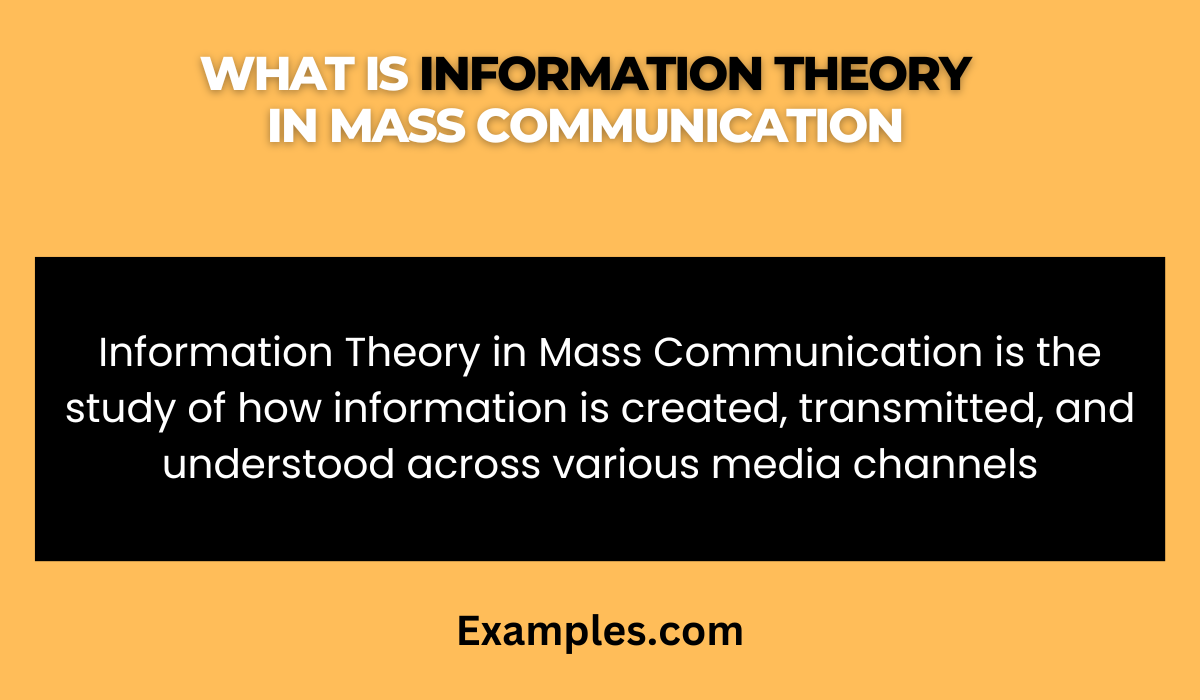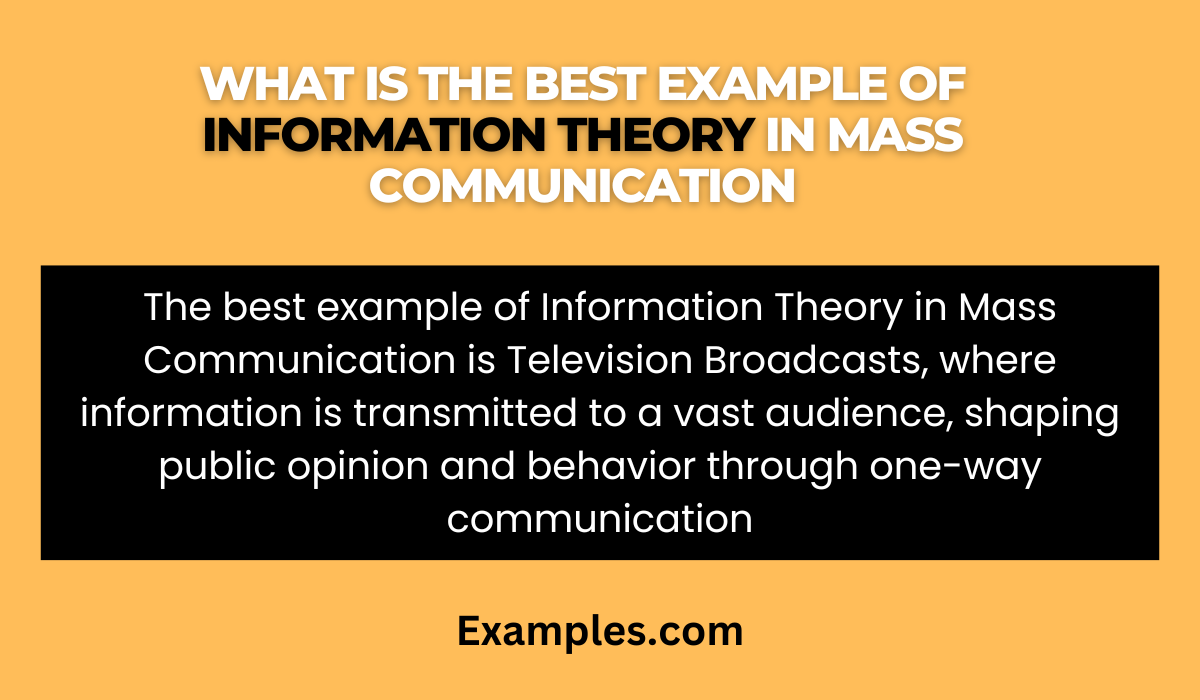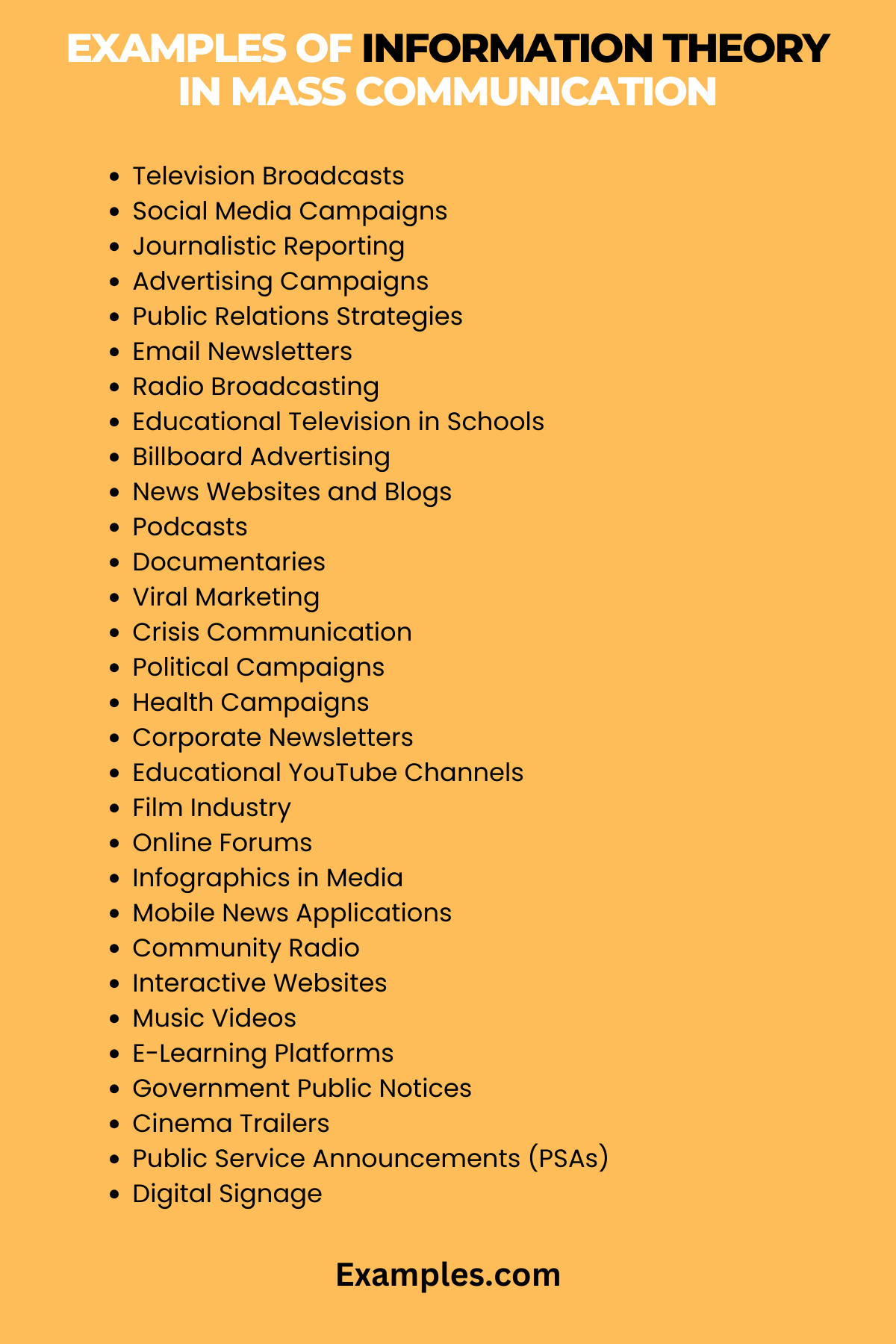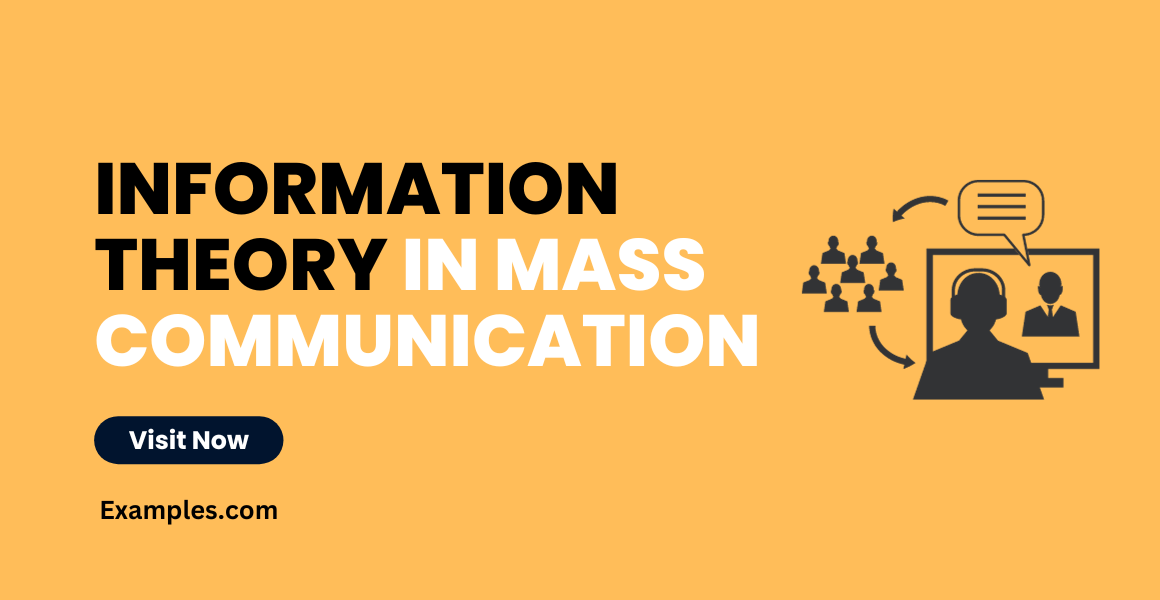29+ Information Theory in Mass Communication Examples
In the dynamic field of Mass Communication, understanding the principles of Information Theory is crucial. This comprehensive guide delves into how Information Theory in Mass Communication shapes the way we perceive and interact with media. Whether you’re exploring Mass Communication jobs/careers or analyzing Mass Communication scenarios/situations, this guide offers insightful perspectives. It’s tailored to unravel the complexities of information dissemination and its impact on society, making it an essential resource for students, professionals, and enthusiasts in the realm of Mass Communication.
What is Information Theory in Mass Communication
Information theory in mass communication is a pivotal concept that explores how information is transmitted, processed, and interpreted within the realms of mass media. It delves into the understanding of the transmission of messages from the source to the receiver, focusing on the processes of encoding, sending, decoding, and interpreting information. This theory plays a critical role in understanding the impact and effectiveness of various forms of mass communication, from traditional media like television and radio to modern platforms like social media and digital journalism.

History of Information Theory in Mass Communication
The roots of information theory in mass communication trace back to the mid-20th century, with the groundbreaking work of Claude Shannon and Warren Weaver. Originally developed to improve telecommunication systems, Shannon and Weaver’s model laid the foundation for modern communication theory. This model was soon applied to mass communication, offering a systematic way to study how information is disseminated and received on a large scale. Over the years, this theory has evolved, incorporating elements from mass communication characteristics and adapting to the ever-changing landscape of media technologies.
What is the Best Example of Information Theory in Mass Communication
A prime example of information theory in mass communication can be observed in the realm of television broadcasting. In this scenario, a news studio (the source) encodes information into a news broadcast. This encoded message is then transmitted through television signals (the channel) to the audience (the receivers). The viewers decode this information, interpreting it based on their individual contexts and backgrounds. This example demonstrates the core principles of information theory – the encoding, transmission, decoding, and interpretation of messages – in a practical, real-world mass communication situation.

30 Examples of Information Theory in Mass Communication
Information theory plays a pivotal role in mass communication, offering a profound understanding of how messages are crafted, transmitted, and perceived in various mediums. This theory, central to mass communication, delves into the processes and effects of information dissemination, highlighting the intricate dynamics between communicators and audiences. Let’s explore 30 unique examples, illustrating the depth and versatility of information theory in mass communication:

- Television Broadcasts: Television Mass Communication exemplifies information theory through its one-way communication model, where broadcasters transmit information to a vast audience, often shaping public opinion and behavior.
- Social Media Campaigns: Platforms like Facebook and Twitter demonstrate Mass Personal Communication, enabling users to share information rapidly across a global network, influencing public discourse and individual perspectives.
- Journalistic Reporting: Journalism Mass Communication utilizes information theory in crafting news stories that inform and engage the public, often setting the agenda for societal discussions and priorities.
- Advertising Campaigns: Advertisements, a cornerstone of Mass Communication in Advertising, use persuasive messaging to influence consumer behavior, illustrating the theory’s application in shaping market trends and preferences.
- Public Relations Strategies: Public Relations Mass Communication leverages information theory to manage public perception of organizations, employing strategic communication to build and maintain a positive image.
- Email Newsletters: Email Mass Communication is a direct method of disseminating information to targeted audiences, often used by businesses and organizations for updates and marketing.
- Radio Broadcasting: Radio exemplifies traditional Mass Communication, where information is transmitted to a wide audience, often providing real-time updates and entertainment.
- Educational Television in Schools: Mass Communication Examples in School include educational TV programs, which use visual and auditory elements to enhance learning and information retention.
- Billboard Advertising: Billboards are a form of Billboard Mass Communication, displaying messages to a large, diverse audience, often in high-traffic areas, for maximum exposure.
- News Websites and Blogs: Digital platforms, part of Blog Mass Communication, allow for instant dissemination of news and opinions, reaching a global audience with ease.
- Podcasts: Podcasts offer a personalized approach to Mass Communication, providing content on a variety of topics to a wide yet niche audience.

- Documentaries: Documentaries in Broadcasting Mass Communication combine storytelling with factual information, often influencing public opinion and awareness on critical issues.
- Viral Marketing: Viral campaigns, a modern facet of Social media Mass Communication, demonstrate how information can rapidly spread across networks, significantly impacting brand visibility and reputation.
- Crisis Communication: Effective crisis management in Public Relations Mass Communication hinges on the timely and accurate dissemination of information to mitigate negative impacts.
- Political Campaigns: In political Mass Communication, information theory is central to understanding how messages influence voter perceptions and behaviors.
- Health Campaigns: Public health messages, crucial in Mass Communication Scenario/ Situation, use strategic communication to educate and influence health behaviors.
- Corporate Newsletters: These internal communication tools are examples of Email Mass Communication, fostering corporate culture and keeping employees informed.
- Educational YouTube Channels: These channels, part of Television Mass Communication, provide accessible and engaging educational content, reaching diverse audiences worldwide.
- Film Industry: Movies, an integral part of Broadcasting Mass Communication, use storytelling to convey messages, often reflecting societal values and issues.
- Online Forums: Forums are platforms for Mass Personal Communication, where information exchange and discussion among users shape collective knowledge.
- Infographics in Media: Infographics in Printing Mass Communication visually represent data, making complex information easily understandable for mass audiences.
- Mobile News Applications: These apps are modern examples of Mass Communication in a Digital Age, providing personalized news feeds to users on the go.

- Community Radio: Local radio stations, part of Journalism Mass Communication, play a crucial role in disseminating information to specific communities, often addressing local issues and interests.
- Interactive Websites: Websites that offer interactive experiences exemplify Mass Communication Examples in Journalism, engaging users in a more dynamic way than traditional media.
- Music Videos: As a form of Television Mass Communication, music videos combine audio and visual elements to convey artistic and often social messages.
- E-Learning Platforms: These platforms demonstrate Mass Communication Examples in School, using multimedia content to enhance remote education.
- Government Public Notices: Distributed via various Mass Communication channels, these notices inform the public about important government policies and updates.
- Cinema Trailers: Movie trailers, an aspect of Broadcasting Mass Communication, are designed to capture audience interest and anticipation through compelling previews.
- Public Service Announcements (PSAs): PSAs utilize Television Mass Communication to deliver important societal messages, aiming to influence public behavior for social good.
- Digital Signage: Used in public spaces, digital signage is a form of Billboard Mass Communication, displaying dynamic content for advertising or information dissemination.
Role of Information Theory in Mass Communication
Information Theory is a critical component in the field of mass communication. It offers a framework for understanding how information is processed, transmitted, and received in various media channels. Here are some detailed points and explanations about its role:
- Quantifying Information Exchange: Information Theory helps in quantifying the amount of information being sent and received. This quantification is essential in mass media, where understanding the reach and impact of a message is crucial.
- Understanding Channel Capacity: It assists in understanding the capacity of various communication channels, like television mass communication or social media mass communication, ensuring efficient information transfer without overloading the system.
- Reducing Noise and Enhancing Clarity: In mass communication, noise can distort the intended message. Information Theory guides the process of reducing noise and enhancing the clarity of the message.
- Message Encoding and Decoding: It plays a vital role in the encoding and decoding of messages, ensuring that the intended audience correctly interprets the information.
- Feedback Analysis: Information Theory is used to analyze feedback from the audience, helping in refining and improving future communication strategies.
Importance of Information Theory in Mass Communication
The importance of Information Theory in mass communication is manifold. Here’s an in-depth look:
- Effective Message Transmission: It ensures the effective transmission of messages to a broad audience, which is a fundamental aspect of mass communication examples in school or mainstream media.
- Target Audience Analysis: Information Theory aids in analyzing and segmenting the target audience, which is crucial for tailored communication strategies.
- Enhancing Communication Efficiency: By understanding channel capacities and noise reduction techniques, it significantly enhances communication efficiency.
- Impact on Media Research: It offers a theoretical foundation for media research, influencing the development of new communication technologies and platforms.
- Global Communication Networks: In today’s digital age, Information Theory is pivotal in managing global communication networks, ensuring that messages are conveyed across different cultures and languages effectively.
How to Use Information Theory in Mass Communication
Applying Information Theory in mass communication involves several strategic steps:
- Analyzing Communication Channels: Identify the most effective channels for message dissemination, considering factors like audience reach and channel capacity. This could include email mass communication or broadcasting mass communication.
- Message Design and Encoding: Craft messages with a clear understanding of how they will be encoded and decoded. This includes choosing appropriate language, symbols, and formats that resonate with the intended audience.
- Feedback Mechanisms: Implement robust feedback mechanisms to gauge audience reception and interpretation of the message.
- Adapting to Technological Advancements: Stay updated with technological advancements in communication, like blog mass communication or social media mass communication, to leverage their potential fully.
- Crisis Communication: Utilize Information Theory to develop effective crisis communication strategies, ensuring quick and clear dissemination of critical information during emergencies.
Information Theory in Mass Communication is essential for understanding and optimizing how messages are conveyed and perceived across various media platforms. It provides crucial insights into the dynamics of communication processes, influencing the effectiveness of media strategies in our increasingly digital world.



